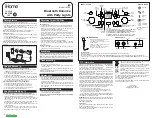
Address Number Verifi cation
All that remains is to verify that the individual IC2-R modules are properly identifi ed in the RHAON network.
IC Squared offers two methods of handling multi cabinet line arrays; the conventional Master/Slave arrangement and an All Master
approach. For small systems having 4 or fewer Array modules, either method can be used. All arrays having 5 or more modules must
use the All Master approach.
In the conventional approach one module serves as the Master and all the other modules are designated Slaves. The incoming signal
and power lines terminate in the Master module and are then linked to the Slave modules with jumper cables. The Master/Slave dip
switches located on each modules input panel are used to set up the assignment. See page 53 for a detailed view of the input panel.
Normally the bottom module will be the Master and the other modules will be the Slaves numbered 1, 2 & 3 in ascending order. How-
ever, as long as the switches are set properly any module can be designated as the Master. You may, for example, designate the top
module as the Master to allow you to bring the signal cables into the top of the array. Set the switches in accordance with the drawing
shown below.
In single cabinet usage and when using the All Master method of control, the dip switches should always be set to the Master setting
(“00”).
Be aware that certain functions will be disabled on the Slave modules as their control has been turned over to the Master module.
Preset Up, Preset Down, Preset Enter , Input Pad, Volume Up & Volume Down, AES/EBU Input and Mute functions are all controlled
only by the controls on the Master module. Signal cables must be brought into the Master module. Jumper cable are then used to link
the modules together. AC power needs to be brought into each module.
Note that if you connected power to the modules before setting the dip switches, you will need to disconnect power and reconnect it
before the dip switch settings will take effect.
In the All Master approach, all modules are treated as Masters and there are no Slaves. The dip switches are all set to the Master
setting and individual signal cables are brought into each module. More details on setting up and using the all Master approach are
provided in the Beam Steering section of this document.
8
1
3
4
2
Master
Setting
Slave #1
Setting
Slave #2
Setting
Slave #3
Setting
IC
2
Users Manual























